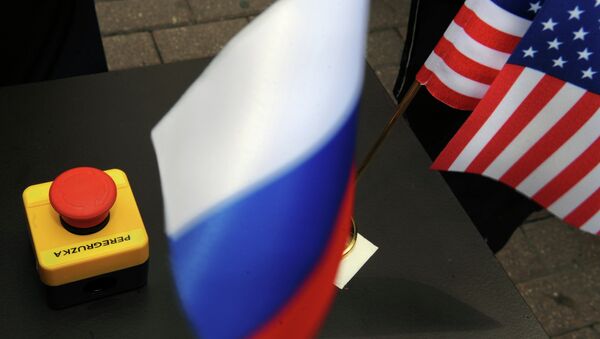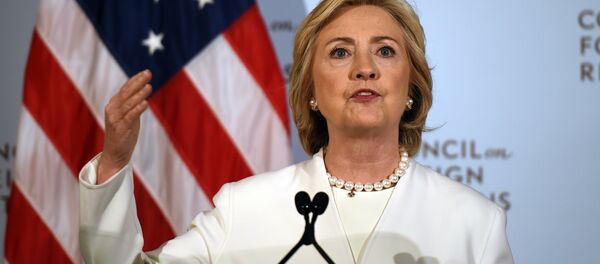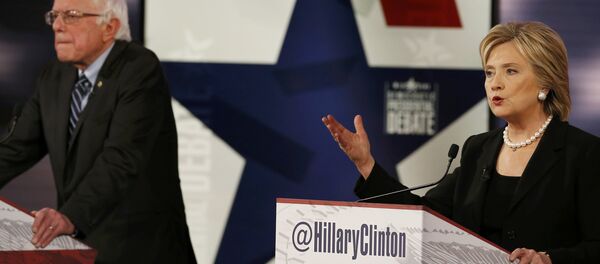During Sunday's Democratic debate, Clinton suggested that a new 'reset' in relations with Russia might be possible, "depending on what the US will get for it." Furthermore, answering a question about her relationship with Russian President Vladimir Putin, Clinton described it as "interesting" and "respectful," quickly adding that she and the president had had some "very tough dealings with each other."
The new tone is a marked change to Clinton's position toward Russia in recent years. During her tenure as secretary of state, Clinton accused Moscow of attempting to 'rebuild the Soviet Union'. After the Ukraine crisis hit, Clinton sharpened her rhetoric, comparing Putin to Hitler, saying that his actions reminded her of "what Hitler did back in the '30s."
Moreover, in the run up to the 2016 presidential campaign, Clinton repeatedly categorized Russia's policies as a "threat to American interests," hurled more insults against the Russian leader, and suggested that ultimately, the US must "stand up to, encircle and…try to choke off [Putin's] ability to be so aggressive."
Clinton's answer at the debate (i.e. that everything will depend on 'what the US gets in return'), is "purely pragmatic," the journalist argues. "For example, Clinton recalled that seven years ago, the US received permission for the transit of NATO military cargo to Afghanistan via Russia, reached an agreement with Moscow on the limitation of nuclear weapons, and another one on sanctions against Iran."
"What she did not mention," Gomsikova adds, "is that the symbolic red button which she presented to Russian Foreign Minister Sergei Lavrov in Geneva in 2009 as a symbol of the reset of relations between Washington and Moscow was slightly defective."
The famous red button on a yellow and black base featured a minor translation error. Instead of reading 'perezagruzka' (reset), the button actually read 'peregruzka' (overload). Written off as a minor flub at the time, Gomsikova recalls that in fact, the error "eventually proved to be prophetic. Clinton had promised Lavrov, who called her attention to the mistranslation, that Washington would not allow for an 'overload' of US-Russian relations. Then there was Libya, Syria, and Ukraine…"
Commenting on Clinton's change of tune, and the prospects for a real 'reset' in relations between Moscow and Washington, Sergei Samuylov, the head of the Center for Research of US Foreign Policy Mechanisms at the Moscow-based Institute for US and Canadian Studies, told Svobodnaya Pressa that "for openers, Hillary Clinton is a leader of the Democratic Party. And the Democrats recognized even ahead of the 2008 election that America is not omnipotent, and cannot lead the world on its own."
"By the way," Samuylov notes, "the incident with the button indicates the very low level of US diplomacy. They were unable to accurately translate one Russian word."
As for the preconditions Clinton has placed on the 'Reset 2', the analyst suggested that "it's difficult to say exactly what she might demand as payment. In recent years, the US establishment has seen very serious debates about the increasing geopolitical role in the world of Russia and China. Therefore, it cannot be ruled out that the US strategy in this polycentric world will be to try and slow the growth of the two countries' global influence."
In any case, Samuylov argues, in Washington's view, a Western-dominated "world order which discriminates against non-Western countries is simply the natural order of things. And when we, or the Chinese, show resentment, or try to create some alternative (such as the new Asian Infrastructure Investment Bank), the US naturally sees it as an encroachment, and presents it as aggression, or a manifestation of imperial ambitions."
"Therefore, in principle, we do not need a 'reset', especially as some sort of handout from the United States. We just need pragmatism – to cooperate where our interests coincide, and to look for compromises in areas of disagreement."
For his part, political analyst and journalist Leonid Krutakov agreed with his fellow expert, saying that sustained dialogue, and some hyped-up 'reset', is what's needed. "I don't know about this reset. Negotiations, of course are necessary. No dialogue means war. I don't think that anyone is interested in a war, on our side or theirs. Therefore, it's necessary to negotiate, especially considering that without Russia, which has a nuclear and military-technical potential comparable to the US, it is impossible to resolve many global issues."
Ultimately, the journalist suggests, "today, security issues are of prime importance. Therefore, Clinton, as a politician a a candidate for president, cannot help but emphasize that she will try to find common ground with Russia. Otherwise, the world could quickly go to hell in a hand basket."




